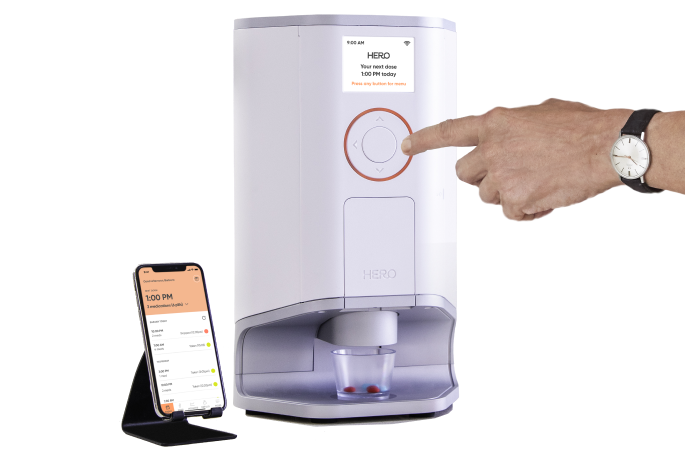Under the weather or serious side effect? When to contact your doctor about your medication

Disclaimer: this article is not medical advice. Patients should never alter their medication regimen without speaking to a healthcare professional first. Illnesses and medication side effects should always be diagnosed by a medical professional.
You’ve admitted it to yourself. You’re not feeling well. While being under the weather is something everyone experiences from time to time, you’re concerned because you just started a new medication. Could your symptoms be side effects or drug interactions? Or are they due to the weather change, a recent stressful event, or something else?
These questions can be difficult to answer, and you may feel like a detective as you try to figure out your symptoms. As such, the first thing to do is examine the evidence in front of you, and get a very clear idea of what exactly you’re experiencing.
First things first: What is a side effect?
According to pharmacist Kristin Howard, a side effect is an unexpected reaction from your medicine. Oftentimes, these reactions are unwanted and may cause problems with your health or ability to function.
You’ve probably experienced side effects while taking over-the-counter medication, like cough medicine that makes you sleepy or allergy medicine that dries your mouth. While these can be mildly annoying, medication can also cause severe side effects, such as difficulty breathing, chest pain, or liver damage.
For prescription drugs, their side effects can be found on the printed information that comes with the medication and sometimes in a medication guide, which is often included with drugs that have serious side effects. If you’re ever concerned about drug side effects, regardless of whether they’re mild or severe, don’t hesitate to get more information from your healthcare provider.
When and why do side effects occur?
Drug side effects in older adults can occur for many reasons and at any time. They could be triggered by a change in your dosage, drug interactions, starting or stopping a medication, or when your prescriptions pile up due to polypharmacy, which is when a patient regularly takes multiple medications to treat their medical condition. Why does this happen?
For one, all of us are unique. Each person’s body reacts differently to a medication, depending on factors such as age, weight, gender, and ethnicity.
While the cause of side effects can sometimes be easily identified, like in cases of prescription overdose, other times it can remain unclear. Medications are often used as a treatment to rebalance parts of the body that aren’t functioning properly. But because the body is a complex organism that works as a whole, one area may improve while other parts may be affected.
Think of it like your work-life balance. There are times when you may become very busy and suddenly find yourself working nights and weekends. Your personal life probably suffers—you see your friends and family less, your house gets messier because you have less time to clean, your diet deteriorates because you eat more fast food and less healthy, prepared meals. But on the positive side, you may be earning more money because of the overtime pay. Your body, just like your life, works as a whole. When one area is affected, others are often affected indirectly.
If it’s not a side effect, what could it be?
To understand whether your symptoms are a side effect or something else, consider the alternatives. Perhaps you have a drug allergy, which could be the case if you have hives, a rash, itchy skin, swollen eyes, or difficulty breathing.
Your symptoms could also be caused by an adverse drug event, which occurs when a patient is harmed by medicine. Adverse drug reactions happen for many reasons, such as a prescription overdose or medication errors, and they can result in organ damage, loss of consciousness, and other serious medical emergencies. Awareness of medication mistakes you’re probably making may help stave off adverse drug events.
Of course, your symptoms could be caused by something else entirely. Perhaps they’ve occured because of acute stress disorder, which can result from a stressful event, like a death in the family, or maybe a change in the weather or a common cold.
Be mindful that taking multiple new medications at the same time makes it difficult to pinpoint whether a specific drug is the cause of your symptoms. Registered Pharmacist Dave Walker shares his personal methodology for dealing with this problem, which involves taking a single prescription medication over a few weeks before starting a second one, following this pattern until you’ve incorporated all your new drugs into your medication regimen. By doing so, you can observe your body’s reaction to one specific drug, which can help you determine if you are actually dealing with a side effect.
5 questions to ask yourself about your symptoms
If you’re still unsure of whether or not your symptoms are a side effect or something else, ask yourself the following questions:
- Is this a common side effect for this medication? If you’re unsure, you can check the pill bottle, your medication guide, or any prescription documents you may have. Or you can simply contact your physician.
- How long does the symptom last? Is it 30 minutes, a few hours, or days at a time? Once you determine the amount of time, review your medication documentation to see if this is normal.
- Could my symptom be a result of something else? As mentioned earlier, an allergic reaction, weather change, or stressful event could be influencing your symptoms.
- Is there a pattern to my symptoms? If you don’t know, consider keeping a symptom diary, which may include details about the timing of your symptoms, the duration, triggers, things that caused relief, and lifestyle considerations. Tracking these patterns can help you identify your symptom’s root cause.
- Did I take my medication properly? If you’re taking multiple prescription drugs, it can be difficult to stay on top of them. Consider a med management solution like Hero to help you take your medication safely and easily.
What to do if you’re still unsure
Sometimes you’ll ask yourself all the above questions and still feel uncertain. When this happens, or when your symptoms cause stress or diminish your quality of life, it’s time to stop playing detective and get help. So don’t hesitate—call your doctor.
When it comes to your health, it’s best to be safe and put your trust in medical professionals with years of experience diagnosing health issues. All you need to do is pick up your phone, schedule an appointment, and ask your provider. He or she can let you know if there’s truly a reason for concern, and you can finally put your mind at ease.
Complex med schedule? We solved it.
Hero’s smart dispenser reminds you to take your meds and dispenses the right dose, at the right time.

The contents of the above article are for informational and educational purposes only. The article is not intended to be a substitute for professional medical advice, diagnosis, or treatment. Always seek the advice of your physician or other qualified clinician with any questions you may have regarding a medical condition or its treatment and do not disregard professional medical advice or delay seeking it because of information published by us. Hero is indicated for medication dispensing for general use and not for patients with any specific disease or condition. Any reference to specific conditions are for informational purposes only and are not indications for use of the device.



